Elizabeth Spann Craig's Blog, page 225
October 20, 2010
Tapping Unconscious Creativity—by K.M. Weiland
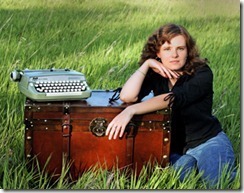 Studies have proven that most people are noticeably stronger in one hemisphere of the brain or the other, mostly due to their tendency to exercise one side more often. Neither side of the brain is better than the other. But, as writers, we can't discount the value of figuring out which side we live in most—and then stretching ourselves to explore the uncharted territories on the other side.
Studies have proven that most people are noticeably stronger in one hemisphere of the brain or the other, mostly due to their tendency to exercise one side more often. Neither side of the brain is better than the other. But, as writers, we can't discount the value of figuring out which side we live in most—and then stretching ourselves to explore the uncharted territories on the other side.
Our work (and our lives) would be pretty useless without the logical sides of our brains. Our writing would be a frenetic wash of color and emotion, which would probably end up being indistinguishable to anyone but ourselves. We need that logical side of our brains to help us organize our thoughts into coherency. But the power of art is almost always the result of the right side of our brains—the unconscious side. So how do we keep our conscious brain out of the way long enough to tap into our unconscious creativity?
1. Make time to dream. In my recently released CD Conquering Writer's Block and Summoning Inspiration (http://www.kmweiland.com/books_CWBASI.php), I talk about the importance of daydreaming. Quietude can be difficult to find in the midst of our hectic lives, but even just a few minutes of daydreaming every day can reap significant results.
2. Don't censure yourself. Creativity is a delicate and temperamental creature, and it often wilts away under the weight of "the rules" or the carping of our infernal internal editors. Not everything that bubbles up from the depths of your unconscious creativity will have worth, but give yourself time to get it on paper and let it rest for a while before judging it.
3. Tell your left brain to zip it. Your left brain can be a pushy character. When he's telling you he thinks he knows best how to write this story, tell him to stow it for a bit, so his chatter doesn't distract you from the offerings of your right brain. Your left brain will get his chance later.
4. Focus on the senses. Our subconscious works on a level deeper than words. It feeds our brains with images, sounds, smells, tastes, and feelings, which our conscious brains then translate into words. Nothing wrong with those words (they're the tools of our trade, after all!), but give a try to focusing on the raw sensations. Close your eyes and visualize the scene you're writing. What colors stand out? What can you smell? What does your body feel like? This is the best way I know to find those all-important "telling" details that bring a scene to life.
5. Listen to your gut instinct. Ever get that itching feeling that something is wrong with a story? You're zipping right along, having a good ol' time with your characters… but something just doesn't feel right. I've learned to trust my gut instinct. I can't think of an instance in which it has ever failed me. We just have to learn to interpret what it's telling us.
Most authors would be the first to admit that the best of their writing is beyond even them. It comes from someplace outside the conscious realm. Once we recognize and accept that fact, we are then able to take advantage of the tremendous opportunity of harnessing our unconscious minds. The two sides of our creativity—the conscious and the unconscious—working in harmony, the one pulsing and pounding ahead, the other slowing and refining, are capable of producing some pretty fantastic things.
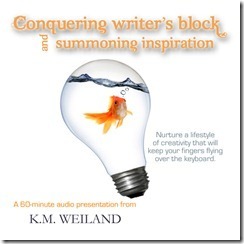 K.M. Weiland writes historical and speculative fiction from her home in the sandhills of western Nebraska. She enjoys mentoring other authors through her
writing tips
, editing services, workshops, and her recently released instructional CD Conquering Writer's Block and Summoning Inspiration.
K.M. Weiland writes historical and speculative fiction from her home in the sandhills of western Nebraska. She enjoys mentoring other authors through her
writing tips
, editing services, workshops, and her recently released instructional CD Conquering Writer's Block and Summoning Inspiration.
October 19, 2010
Importance of Test Readers—by Alex Cavanaugh
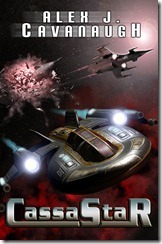 Elizabeth invited me to share with you today something about writing. Since this was an important part of my process, I decided to focus on test readers.
Elizabeth invited me to share with you today something about writing. Since this was an important part of my process, I decided to focus on test readers.
Why would you need test readers? Bluntly put, it's another set of eyeballs on your work. Test readers will see things you've overlooked – stilted dialogue, plot contrivances, continuity errors, lack of information, confusing transitions, and so forth.
We are so close to our work that we often miss these things.
Test readers need to be objective in order to be effective. A spouse or close friend might feel reluctant to hurt your feelings. (Then again, that might be your toughest critic!)
Test readers should be familiar with your genre and know what to look for in a good book. I also believe a mixture of readers and writers is best.
Allow your test readers the opportunity to read through the entire scene or manuscript. When they return your work, read every suggestion and consider changes. If at all possible, sit down with your test readers (or get with them online or on the phone) and discuss each page. Sometimes comments are vague and you need clarification. If there's an issue with a scene, you need to know exactly why it doesn't work. This opens up discussions and you can bounce ideas off each other.
It's easy to grow defensive, but resist the urge. Consider the validity of each suggestion. If your test people had a problem with a scene, then so will other readers. Be open to changes that will improve the flow of your story and strength of your dialogue. Once you've made alterations, let them read it again to be sure all issues were addressed.
My test readers for CassaStar identified several mistakes. They pointed out scenes where more description was required to clarify the situation. They really assisted with my dialogue, suggesting cuts and changes where necessary. We even read through several scenes to achieve a smooth flow of dialogue. Without their help, my manuscript would still be a jumbled mess!
Do you employ test readers?
Alex J. Cavanaugh
http://alexjcavanaugh.blogspot.com/
CassaStar by Alex J. Cavanaugh
October 19, 2010 Science fiction/adventure/space opera
ISBN 9780981621067 Dancing Lemur Press LLC
To pilot the fleet's finest ship…
Few options remain for Byron. A talented but stubborn young man with a troubled past and rebellious attitude, his cockpit skills are his only hope. Slated to train as a Cosbolt fighter pilot, Byron is determined to prove his worth and begin a new life as he sets off for the moon base of Guaard.
Much to Byron's chagrin, the toughest instructor in the fleet takes notice of the young pilot. Haunted by a past tragedy, Bassa eventually sees through Byron's tough exterior and insolence. When a secret talent is revealed during training, Bassa feels compelled to help Byron achieve his full potential.
As war brews on the edge of space, time is running short. Byron requires a navigator of exceptional quality to survive, and Bassa must make a decision that could well decide the fate of both men. Will their skills be enough as they embark on a mission that may stretch their abilities to the limit?
"…calls to mind the youthful focus of Robert Heinlein's early military sf, as well as the excitement of space opera epitomized by the many Star Wars novels. Fast-paced military action and a youthful protagonist make this a good choice for both young adult and adult fans of space wars." - Library Journal
Trailer:
http://www.youtube.com/watch?v=67YBjQve00U
Links to purchase:
AMAZON -
BARNES & NOBLE -
BAM
Also available in eBook format for Kindle, iPad, Nook, and others
Bio:
Alex J. Cavanaugh has a Bachelor of Fine Arts degree and works in web design and graphics. He's experienced in technical editing and worked with an adult literacy program for several years. A fan of all things science fiction, his interests range from books and movies to music and games. Currently he lives in the Carolinas with his wife.
October 18, 2010
The Big Picture
 My 8th grade son is working on a social studies project that's due tomorrow.
My 8th grade son is working on a social studies project that's due tomorrow.
He's carefully portioned out the work over the space of a week. He's researched, cited sources, found images, organized data, and decided on a format.
His teacher gave a grading rubric and he's meticulously followed it, ticking off each thing as he's worked.
I decided to look over the assignment before he handed it in. The research and mechanics and presentation? Wonderful.
The problem? "Sweetie," I said, "this is supposed to be an advertisement. Your brochure needs to convince people to move from overcrowded 1735 Britain to the New World to settle in Massachusetts. The facts are right. But it has to be persuasive."
That was the whole point of the project. Not, however, listed on the rubric. :) He rewrote the material.
I think lots of writers do the same sort of thing. I know I did when I was new to writing— I followed a mental checklist. What was my hook? Did my first sentence grab the reader? Did I use too many adverbs? Show instead of tell? Write too much description…or not enough?
But, really, I was missing the whole point, which should have been: had I written a good story? Had I entertained the reader? Because most of us are writing to entertain.
Instead I should have been asking:
Did my characters come to life on the page? Were there moments of excitement? Humor? Characters for readers to relate to—and characters for them to hate? Was there something at stake for my protagonist?
Would the reader keep turning the pages… for the character depictions, the quality of the writing, or the exciting plot?
The other stuff can be fixed in revisions. Everything, ultimately, just boils down to the story.
It can be hard to get rid of the rubric in our heads—the checklist of the writing rules. How do you return the focus onto your story?
Hope you'll join me tomorrow in welcoming Alex Cavanaugh to Mystery Writing is Murder. He'll be talking about the importance of test readers.
October 17, 2010
Keeping it Simple
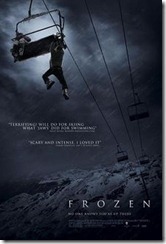 Recently, I heard a couple of different people talk about simplicity in writing.
Recently, I heard a couple of different people talk about simplicity in writing.
The first time, I heard two authors at an event I was attending, talk about another author's books. The books are very successful. "But—they're so simple!" said one author. "The plots aren't complex at all—the stories are just so basic!"
The other author agreed. They'd both worked hard on complicated plotlines with twists and turns and surprises and were amazed that a very simple plot was working so well for readers.
Then, last week, a local movie reviewer came on a radio show to talk about good horror movies to rent for Halloween. His pick wasn't some of the bigger budget horror films, but a movie called "Frozen," which had had a limited theatrical release when it had come out earlier this year, but has apparently started to gain a following.
The movie's plot, said the critic, is very simple. It involves snowboarders who get stuck on a ski lift—and, no one knows they're up there or will know because the resort closes during the week.
And there's a snowstorm, frostbite, extreme cold, scary heights—and wolves.
Very simple. But effective…maybe because it's believable?
My plots aren't really that simple—there are plenty of red herrings alongside clues, suspects tell lies (and tell the truth and it's hard to tell which is which), and there are multiple possibilities for the mystery's solution.
But at the same time, I try not to make it too complicated—after all, this is supposed to be fun.
I think my question is this: why does simplicity work with some plots and are there times when it doesn't work as well as others? How complex or simple are your own plots?
October 16, 2010
Creating Unique Characters—by Marvin D.Wilson
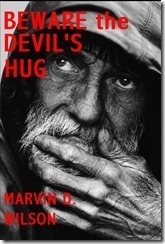 Thanks so much, Elizabeth, for having me on your blog today. When you agreed to host a stop on the tour, you asked for a guest post, offering several suggestions for topics; and I settled on the one about 'how to create distinctive characters for your novels'.
Thanks so much, Elizabeth, for having me on your blog today. When you agreed to host a stop on the tour, you asked for a guest post, offering several suggestions for topics; and I settled on the one about 'how to create distinctive characters for your novels'.
There is the old adage, 'write what you know', and it certainly does help for a writer to have lived long, loved and hated, had several peaks and valleys during the journey, been 'around the block' several times and experienced lots of different situations.
I read that Hemingway would seek out wars and hire on as a mercenary so he could experience the intensity of real life and death battle. I've never been in a war, but part of my writing arsenal is having had a rather widely varied and experiential life background. From a young Hippie Rock and Roll travelling musician, to nightclub entertainer, to a formally trained Zen student, to carpenter, to small business owner, to network marketer, to sales and sales training, to skilled trades instructor and adult education teacher, to public speaker and motivational coach, to mention some.
I came from a small, lily-white northern Michigan town, but have during my adult life hung out in metropolitan cities, been down in the ghettos and made friends there, got to know and make friends with people of all races, ethnic and religious backgrounds. And I have had first hand experience with serious narcotics addiction, complete with considerable interaction with underworld characters: hookers, drug dealers, hustlers, etc. So it's easy for me to draw from all the different types of people I have known to put composite characters together that are going to feel real to the reader because they are based on actual people I've known. Not usually just one person, but piece this from that one with that from another—that sort of thing.
But a writer does not have to have all that much first hand life experience to create real and distinctive characters. You can write people that you never have 'known'. You just have to be a fastidious observer, a people watcher at all times, a perpetual, insatiable sponge of information gathering. Go sit in the mall and watch people. If you are from a small town, go to big cities and hang around downtown observing people. And visa versa if you're from the big city and have not experienced small town living. Interview crooks, ex-cons of all types of crimes, set appointments with pastors, doctors, nurses, pilots, war vets, etc., and build up a vicarious life experience background from which to draw on when creating characters.
Also important is making sure you keep your 'self' out of your characters. Unless you want to speak through a character who is going to represent you and your messages, and that is perfectly fine—just keep it to one—you should guard against having your characters talk and act like you do. As an editor I see this all the time from novice writers. There might be anywhere from three to seven main and supporting characters and all of them use the same pet phrases—an obvious giveaway that the author uses those phrases. Same goes for mannerisms, emotional reactions, everything. Create one-of-a-kind characters, each with his or her own mental, emotional, physical, spiritual, ethical and moral, sexual persuasion, whatever, makeup.
Here are a couple things that can help. One, keep a character journal. For every main and supporting character, have a list of all their characteristics, including special notes to yourself as you write and develop them. Here's a sample from my Hugs character journal-
Full name: Destiny Marie Jackson – Nickname, "Cocoa"
Gender: Female
Age: Twenty nine
Height: 5' 7"
Weight: 110 lb
Race: African American
Occupation: Prostitute
Skin tone: Creamy coffee when healthy, ashy when book opens and she is on heroin
Eyes: Brown
Hair: Unkempt medium sized Afro
Body type: Slender, medium sized perky breasts, long legged
Sexual persuasion: strongly sexed heterosexual, and totally not satisfied sexually in spite of all the sex she's having.
Voice tone: Raspy alto
Speech mannerisms: ghetto slang talker, swears a lot in opening chapters. As story unfolds she cleans up her language and expands her vocabulary.
Pet phrases: hecky; good googely moogely; okey dokey
Distinguishing features: large scar under her chin. Tramp stamp tattoo of a Harley Davidson logo
Role in story and relationship to other characters: Secondary main character, falls in love with and marries The Old Man. Becomes best friends with Angel, Christian Wilson's fiancé.
Religion/spiritual path: Agnostic at first, then Christian
Notes: Abused sexually by her father as an early teenager. She ran away from home at 16, never finished high school. Her parents live off Fenkel Street, just west of Livernois. She now lives on eight mile. Likes pizza, hip-hop, Mountain Dew, not a heavy alcohol drinker, favorite books are romance novels. Detroit Pistons fan.
~~~~~
I use the same list for all my characters. I might not have all the categories filled in as I start writing, but I go to the journal and fill in the blanks as they are created.
And here's another technique I've just started using: before you write your book, interview your main characters. Just as if they were sitting in the room with you, ask them questions like ...
· What is your favorite food? (ask color, music, kinds of books, movies, etc)
· What are your core spiritual beliefs?
· If you were in a situation where you could help someone—a total stranger in desperate need—but it meant you had to make a personal sacrifice to do so, what would you do?
· What was your upbringing, your family situation like?
· What do you hate the most in life?
· What do your fear most?
· What turns you on, makes you happy?
· In a relationship, what do you want to get out of it ... be it a sexual, life partner, friendship, spiritual, or business relationship?
You get the idea. Be creative, and adjust the kinds of questions you ask your characters according to the genre you are writing in.
So there are some ideas, some things I've found to be helpful in creating and developing unique, distinctive, and believable characters. I hope you all find them useful, and I do look forward to reading the comments today. All you writers ... share with us one of your special techniques, hmm?
"Beware the Devil's Hug" introduces readers to a mishmash of deftly-drawn, misguided characters who are prone to bad decisions and worse circumstances. But as one homeless man proves, things are not always what they seem. This book is part-magical realism, part-spirituality and part-social commentary; and remarkably, Wilson's cornucopia works harmoniously to create an utterly engrossing and enlightening story."
~ Jen Knox, author of Musical Chairs (a memoir), and the forthcoming novel, Absurd Hunger
Marvin D. Wilson writes primarily in the spiritual/inspirational genre, but likes to pen "cross-
over" novels that appeal to a wide variety of readers. His books are uplifting, sometimes
weighty, oftentimes humorous, abidingly thought-provoking, meant to instill and create
passion and emotion, more than occasionally provocative to the point of controversial,
and always "tell it like it is", real world, no punches pulled writing.
He likes to deliver spiritual messages in a non-preachy, often irreverent, sometimes sexy and ribald way, through the medium of an entertaining story.
Twitterific
![Terry3_thumb[1]](https://i.gr-assets.com/images/S/compressed.photo.goodreads.com/hostedimages/1380443045i/1333250.png) Here are writing links that I've posted to Twitter for the past week. I'm doing a special Saturday version of Twitterific since I'll be hosting a guest tomorrow—Marvin Wilson.
Here are writing links that I've posted to Twitter for the past week. I'm doing a special Saturday version of Twitterific since I'll be hosting a guest tomorrow—Marvin Wilson.
If you're looking for a particular topic, just plug in your keyword into the search box at the top left-hand corner of the blog (on the black header right above my blog name…next to the Blogger symbol…the small search window is next to the magnifying glass) and the roundup with your subject will come up. To narrow your search down on the page, do a CTRL+F, type your subject, and hit enter.
Hope you'll return tomorrow as Marvin Wilson addresses "Creating Unique Characters."
Some questions to ask as you revise: http://dld.bz/zAn6
How to Use the New Twitter Design (Video Tutorial): http://dld.bz/zAnu
The Fiction of Memories: http://dld.bz/zAmk
5 Ways to Make Your Blog Posts Outstanding: http://dld.bz/zAkF
Madonna's 6 Secrets to Personal Branding Mastery: http://dld.bz/zAjU
On Teaching the Graphic Novel: http://dld.bz/zAnU
Writing Erotica: A Little Steam May Be Just What You Need: http://dld.bz/zAjP
3 Critical Steps After Rejection: http://dld.bz/zAjE
5 basic tips for writers: http://dld.bz/zAjB
When truth is too strange for fiction: http://dld.bz/zAjv
How a writer can develop multiple streams of revenue: part one: http://dld.bz/zAhF
Future Classics: Best science fiction by women written 2001-2010: http://dld.bz/zAhD
Considering A Rewrite? Some things to mull over: http://dld.bz/zAh6
Newbie writers: Watch out for these big writing no-no's: http://dld.bz/zAh3
Are you organizing your novel's information well? http://dld.bz/zAhn
Judge Refuses To Dismiss Suit Against J.K. Rowling (NPR): http://dld.bz/zAgR
This Query Sucks (or how to fail and still succeed): http://dld.bz/zzaj
Dialogue tips--a balancing act: http://dld.bz/zzac
5 Resources To Help You Plan Your NaNoWriMo Novel: http://dld.bz/zyZQ
An agent on--"I Was Published In The Past And Want To Be Published Now!": http://dld.bz/zyXM
Small ways to show, and when to tell: http://dld.bz/zyXF
Writing Discipline. Or Not. http://dld.bz/zyXD
How to Integrate Video Into Your Social Media Marketing: http://dld.bz/zyX3
How To Adjust Your Blog According To Your Visitors: http://dld.bz/zyXz
Reading like a writer (Writer's Digest): http://dld.bz/zyUK
Myst. Lov. Kitchen: Coffee Drinking Cocker Spaniels and a THIRD RAIL LATTE for Victoria http://bit.ly/bAkbnS @CleoCoyle
10 ways to know your WIP is in trouble: http://dld.bz/zyJH
Are You a Triple-Crown Writer? http://dld.bz/zyJx
Social Media Savvy–The Art of Making Others Feel Welcome: http://dld.bz/zyJu
The Writer's 10 Commandments: http://dld.bz/zyHT
Is the First Line Really THAT Important? http://dld.bz/zyFa
Let's talk about goals--for your characters: http://bit.ly/9ypQpQ @p2p_editor
Synopsis transition words: http://dld.bz/zyEw
Dr. Seuss Manuscript Surfaces: http://dld.bz/zAnY
What's our character like on an *ordinary* day (when they're not trying to save the world): http://dld.bz/z9M8
Unpublished writers--an agent on your chances of getting published: http://dld.bz/zyEk
Writing a sex scene is an impossible task (Telegraph): http://dld.bz/z9J9
Adults Take the Fun Out of Reading, Again (Huff Post): http://dld.bz/zqun
Ease Up On The Self-Pressure: http://dld.bz/zh5k
The Nine Stages of Dating a Novel: http://dld.bz/zh4t
The Future of Publishing: You Get to Decide (Writer's Digest--Friedman): http://dld.bz/zh4f
6 reasons you should be a writer: http://dld.bz/zh4c
The Best Characters of All: Seth Johnson on Gaming & Writing: http://dld.bz/zh38
Myths and misconceptions in publishing: http://dld.bz/zh3y
What do writers make at different publishers? The famous (and now updated) "Show Me the Money" survey with answers: http://dld.bz/z6f2
Five Digital Publishing Considerations: http://dld.bz/zh3t
Plots and Characters and Settings, Oh My! http://dld.bz/zh3r
Why You Shouldn't Click "Free Public Wifi" Network While Writing Remotely: http://dld.bz/zh3n
What Writers Can Learn from the Masters of Horror: http://dld.bz/zh3a
Keeping Books vs. Getting Rid of Books: http://dld.bz/zhzt
Are Book Signings Worth the Time & Effort? http://dld.bz/zhyY @jodyhedlund
Writing mentors: http://dld.bz/zhyU
Your blog is your resume: http://dld.bz/zhyG
Myst. Lov. Kitchen: A Family-Pleasing Casserole—Creamy Beef Noodle http://bit.ly/aFEAHm @CleoCoyle
Thoughts on Writing Series: http://dld.bz/zhy5
The rebooted "Sherlock" world where Dr. Watson blogs and Holmes prefers to text: http://dld.bz/zhym
How to email a busy person (like an agent):--six tips for effective emails: http://dld.bz/zeWM
When writing just isn't fun anymore: http://dld.bz/zeUG
Word Count Violations and You: http://dld.bz/zeUu
Sex in YA: http://dld.bz/zyYH
Why the Booker is the best literary award (Salon): http://dld.bz/zyKk
To be or not to be: on passive writing-- http://dld.bz/zeUn
2010 National Book Award Finalists Announced: http://dld.bz/zyKc
Talking crap about your WiP: http://dld.bz/zeT6
Mistakes writers make: "Dear Editor": http://dld.bz/zeT4
Thinking as Writing: http://dld.bz/zeTy
A publishing timeline: http://dld.bz/zeTm
How to use Facebook to promote your writing business: http://dld.bz/zeTc
The Best-Selling Novels That Made You Snore: http://dld.bz/zeSW
10 things writers know: http://dld.bz/zwhZ @elspethwrites
Five Ways to Add Suspense to Your Story: http://dld.bz/zeSJ
Mystery Writer's Guide to Forensic Science: Poisonous Plants: http://dld.bz/zwgR @clarissadraper
On book blurbs--why an author might not be able to blurb your book: http://dld.bz/zwjZ
Debunking some publishing myths: http://dld.bz/zeSx
Tips for writing emotionally gripping scenes (use visceral reactions): http://dld.bz/zwfp @authorterryo
A Few Common Writing Problems: http://dld.bz/zeRN
An unusual writing challenge: http://dld.bz/zeR7
Myst. Lov. Kitchen: Cupcake Love-In was off the hook! http://bit.ly/d9s9fs @CleoCoyle
Choosing Which Manuscript to Query: http://dld.bz/zeRz
A Few Words on Word Counts: http://dld.bz/zeRr
On Ted Hughes's 'Last Letter' to Sylvia Plath (Guardian): http://dld.bz/zeQW
Creating a character is like dressing a mannequin: http://dld.bz/zaQb @YolaRamunno
Myst. Lov. Kitchen: And the winner is... http://bit.ly/aguosh @CleoCoyle
Nobel Literature Winner Tried Other Jobs (NPR): http://dld.bz/zaPX
Top 10 Classic Horror Stories: http://dld.bz/zaPW
Writing long fiction--the allure of plus-sized books: http://dld.bz/zaPM
Publisher Evaluations--a Checklist: http://dld.bz/zaPF
How to create a futuristic world (with working link!) :) : http://dld.bz/zrWe
The 7 Deadly Fears of Blogging and How to Overcome Them: http://dld.bz/zaEE
The printed book is not dead yet (Guardian): http://dld.bz/zaED
The All-Important First Chapter (and tips for yours) : http://dld.bz/zaE7
Writers should have a domain name--here's how: http://dld.bz/zaEv @clarissadraper
How to write presidents, kings, queens and superstars: http://dld.bz/zaEk @dirtywhitecandy
5 Ways to (Re-)Capture Creativity: http://dld.bz/zaEh
Brainstorming--Turn "What If" Into "Maybe": http://dld.bz/zptq @ultraswan
The Value of Writing for Anthologies: http://dld.bz/zaDp
Writing Tip: Use of Body Language: http://dld.bz/zaDf
Writer's block--2 different types and resources to cure yourself of it: http://dld.bz/zn2W
5 Free Online Writing Courses for Freelancers: http://dld.bz/yUEb
10 typical questions from writers (that are really just fear in disguise): http://dld.bz/zn2D
Winning the staring contest: http://dld.bz/yUDY
Halloween Mysteries 2010: http://dld.bz/yUD8 @JanetRudolph
Comics Publishers Recognize Digital Opportunity: http://dld.bz/yHpB
Dickens in Lagos: http://dld.bz/yHp8
Myst. Lov. Kitchen: http://bit.ly/ctPUfI @CleoCoyle
10 Minutes of Fun: (The Importance of Not Taking Our Writing Too Seriously): http://dld.bz/yHpz
Myst. Lov. Kitchen: Julie's Fish Delish! http://bit.ly/cRL3JL @CleoCoyle
Children's writers--Cricket Magazine Group Looking for Writers and Illustrators: http://dld.bz/yHpv
Matt Forbeck on Gaming & Writing: http://dld.bz/yHpp
Self-Esteem Tool Kit, for Writers: http://dld.bz/yHpf
A Tale of Contracts: One Children's Author's Experience: http://dld.bz/zhWV
Tautologies: http://dld.bz/yHnF
Writing memoirs--thoughts on making yours as readable as fiction: http://dld.bz/yHnC
Book promo gone wrong--book thrown at Obama a misguided publicity stunt? http://dld.bz/zh4y
An RSS rant: http://bit.ly/bTqqBj (I second this--it's hard for me to find blogs to tweet w/ truncated feeds in my Reader). @nethspace
Are US Publishers Using E-books to Undermine Territorial Rights? http://dld.bz/yHnn
How Not to Be Inspired: http://dld.bz/yHnj
Writer Zen Ten: http://dld.bz/yHmS
Can We Create a National Digital Library? http://dld.bz/yHmF
American writers--want to be a writer-in-residence? Try crossing the Atlantic: http://dld.bz/yHmA
Developing a character? Try this questionnaire: http://bit.ly/charchart @epiguide
Picture Books No Longer a Staple for Children (NY Times): http://dld.bz/yHm2
A Character Development Questionnaire: http://dld.bz/yHmf
Police procedure and info to help crime writers get their facts straight: http://dld.bz/zeTQ @authorterryo
Are You Overworking? 7 Important Steps To Avoid Burnout: http://dld.bz/yDFT
10 ways to start your mystery with a bang: http://dld.bz/zeRj
5 Blog Naming Basics: http://dld.bz/yDFK
I Can, I Will, I Should, Maybe Later: http://dld.bz/yDE2
Tips for querying: http://dld.bz/yDEu
5 Articles You Should've Read Over the Summer (Writer's Digest): http://dld.bz/yDEf
Two Brilliant Strategies for Overcoming Fear of Failure: http://dld.bz/yDEa
E-book Pricing: http://dld.bz/yDDT
Myst. Lov. Kitchen: Do you love breakfast? http://bit.ly/aniKMp @CleoCoyle
5 Life Skills You Already Have that Can Make You a Great Blogger: http://dld.bz/yDDQ
50 Excellent Photography-Related Tutorials (for all the writers who dabble in photography): http://dld.bz/zaFr
The magic of reading aloud: http://dld.bz/yDDt
Self-help and Memoir: Dos and Don'ts to Save Your Book: http://dld.bz/yDDK
Buying books is fun, with a glass in your hand (Guardian): http://dld.bz/zaQQ
How to Promote your Book with a Blog Tour: http://dld.bz/zaET @annerallen
Excel For Authors – Characterization: http://dld.bz/yDDF
How E-Readers Are Changing Readers (Atlantic): http://dld.bz/zaQF
Best Tweets for Writers (week ending 10/8/10): http://dld.bz/zaEN
7 Things Your Blog's Sidebar Can't Live Without: http://dld.bz/yDDv
10 essentials for an inspired author's life: http://dld.bz/yDDd
Why Should You Publish a Regular Email Newsletter? http://dld.bz/yDDa
12 Reasons to be Excited About Publishing's Future: http://dld.bz/yDCX
When should you stop marketing your book? http://dld.bz/yDCU
The Easy-to-Use Tool that Helps You Build a Breakthrough Blog (for WordPress users): http://dld.bz/yDCH
6 Self-Confidence Tips for Writers: http://dld.bz/yDBG
Strong Dialogue: http://dld.bz/yDB7
Twitterific--the week in tweets: http://dld.bz/yXyQ
Wordiness: "The Post in Which I Discuss Reduction of the Aforementioned": http://dld.bz/yDA9
Refresh Your Writing By Leaving The Past In The Past: http://dld.bz/yDA3
Deleting Hard Returns with Find and Replace: http://dld.bz/yDAk
5 Ways to Become Your Own Muse: http://dld.bz/yD9G
How to Promote Your Facebook Fan Page: http://dld.bz/yD95
Subscribing to Blogs in a Feed Reader: http://dld.bz/yD93
Publishers Weekly Editor Finds Egregious Formatting Problems In Poetry E-Books (NPR): http://dld.bz/yD9r
National Graphic Novel Writing Month (part 3): http://dld.bz/ySyu
Myst. Lov. Kitchen: Welcome Kathy Borich! http://bit.ly/9ejTOL @CleoCoyle
5 situations where it's better to tell than show in your fiction: http://dld.bz/ySxU
YA writers--don't be a geezer: http://dld.bz/ySxJ
Procrastination: 5 Perspectives: http://dld.bz/ySxF
Backing up your work--some options: http://dld.bz/yVsh @DaphWrites
5 Ways Gigs with Deadlines Help Freelance Writers: http://dld.bz/ySxA
Author Branding: The You That Is Everywhere: http://dld.bz/ySx9
Keeping Ourselves & Our Stories as Pliable as Clay: http://dld.bz/ySxw
October 14, 2010
More Adventures in Accidental Marketing
 I spend a lot of time doing different promotional things to make sure I'm doing my part in marketing my book.
I spend a lot of time doing different promotional things to make sure I'm doing my part in marketing my book.
I purchase bookmarks and business cards. I make appearances and sign books. I do a lot of things online.
And then, sometimes, you find out that the most effective marketing is purely accidental.
My mother called me one day to say someone had stopped her at the YMCA to tell her that they didn't know I wrote books…and they'd gone out to buy them.
They'd found out because my college had run a few paragraphs about me in the alumnae section of their magazine that goes out every quarter to alums.
The next day I heard from another alumna from my college—who didn't know me. She tweeted me on Twitter that she didn't realize we'd gone to the same school until she got the alumnae magazine. She was planning on buying my books.
Then I was at the church, volunteering last week, and the other mother in the kitchen with me remembered me from the alumnae magazine and started talking to me about my books.
You'd think that I'd gone to a big school…but I went to a small, private, liberal arts school in Clinton, South Carolina. With enrollment at 1,100 students.
And yet, for that month, I think it was the most exceptional bit of marketing out of everything else I tried.
And I hadn't even run the blurb.
The English department at the college had somehow made the connection, found a bio of me online and a picture, and run the update in the magazine.
My lesson in this? I'm thinking that we should all be thinking outside the box. Sometimes we've already got connections to potential readers—from our past—and those can be easier to tap than developing new connections (although those are important, too.) And not be too shy—who knows what opportunities we're missing?
I think, though, that sometimes it's harder for us to market to our connections. It seems more like selling. I'm not fond of selling, either. But I like the idea of things like updating my alumnae magazine from time to time.
Here are some good resources for the reluctant marketer:
Conquering Book Marketing Fear—7 Tips for the Introverted Writer
How Authors Can Participate in Marketing Even When They Don't Like Selling
A post I wrote for Hart Johnson's blog on marketing tips I've learned
Marketing for the non-fiction author
A blog series on marketing lessons
Have you got any tips for painless promotion? How do you feel about marketing, in general?
October 13, 2010
What is Our Character Like on an *Ordinary* Day?
 Masterpiece Mystery is my favorite show on TV right now, and I've really enjoyed their recent airing of "Inspector Lewis." It's a spin-off of the old Inspector Morse series, based on the mysteries by Colin Dexter. The same actor plays Lewis in both the Morse series and the Lewis ones.
Masterpiece Mystery is my favorite show on TV right now, and I've really enjoyed their recent airing of "Inspector Lewis." It's a spin-off of the old Inspector Morse series, based on the mysteries by Colin Dexter. The same actor plays Lewis in both the Morse series and the Lewis ones.
The new series renewed my interest in watching the old one again—and PBS came through for me once more when I discovered they were running the shows on Friday nights.
Inspector Morse is an interesting character and I really respect the late Colin Dexter for his creation. He wrote an amazingly intuitive detective with a brilliant mind and incredible deductive ability.
But the most interesting thing about the character and why so many readers fell in love with him is what he was like when he wasn't solving crimes. He was difficult and quiet—a lover of crosswords, classical music (especially Wagner), art, classical literature, and beer. He spoke his mind. He was crusty, grouchy—and fascinating.
I think, actually, the success of the series is due in large part to who Inspector Morse was in his spare time…when he wasn't solving a crime and wasn't facing a crisis.
This really makes me think. So much of our energy as a writer is poured (and rightly so) into the conflict the protagonist is facing and how they handle it. How can we best fit in the tidbits about the character—the non-conflict-related stuff that makes us love them?
I think our character needs to have a little bit of downtime in our books. Not enough, obviously, to bore the reader or interrupt the progression of the plot to a large degree—but enough for our readers to really get acquainted with our protagonist. Enough for us to develop our character a little bit and show the kind of person they are when they're not working out the book's conflict.
Aside from that, I think dialogue helps. We can find out a lot about our character through their interactions with secondary characters.
Even sketching out our characters' house can tell us about them. How do they live? Can we tell what's important to them by their possessions? Do they have trophies on their mantel from sports' victories…or middle school spelling bees? Do they have lots of family pictures in frames? Is their house spartan or cluttered?
What kinds of things does your character do…when they're not busy saving the world? How do you slip it in enough to intrigue the reader instead of boring them?
October 12, 2010
Blurbs
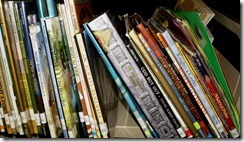 Do book blurbs influence your book buying habits?
Do book blurbs influence your book buying habits?
Apparently publishers think so because you'll find blurbs on front and back covers of many books—and they're hoping if you see that one of your favorite authors loved a book…that maybe you'll buy it to see if you'll love it, too.
The process of getting blurbs, though, is a little unusual—actually, there are lots of different ways to go about it.
I was delighted to get some great blurbs from several authors I really respect, who write books in my genre, for Delicious and Suspicious. My editor at Penguin asked me, months before the book went into production, if I had any ideas of authors I'd like to ask to blurb my book. And I did.
My editor did something I really appreciated—she asked the authors' editors if it was all right if they blurbed me. A couple of the writers have more than one series and she was concerned that they would feel like they needed to try to fit in reading my book when they should be writing their own, instead.
I've also blurbed another book in my genre for another Penguin author and was happy to do so. But last week, I had a request to blurb a book…and there was just no way I can.
Right now I'm absolutely swamped with my own writing and promo-related stuff. I felt bad about it, but I knew that I would be really frantic if I fit someone else's galley into the mix.
Reasons you might not be able to blurb a book:
There are only so many hours in the day. And it does take hours to read a book—and then more time to come up with a pithy blurb.
Your agent and/or editor(s) don't want you to blurb right now. Because you're under one or two tight deadlines.
Sometimes people ask you to blurb your book and it's not your genre. I think it makes more sense for an author to blurb a book that's in their genre—that's what the reader is expecting. If Stephen King is endorsing a book, I'm not expecting the book to be a romance.
Sometimes people ask you to blurb their book and you aren't sure if you'll like it. If I'm blurbing a book, I want to be able to wholeheartedly endorse it. You want to be enthusiastic in your support of the book.
With some publishers, there might even be a problem with you endorsing a book at a competing publisher. I've never run across this—but I wouldn't be at all surprised. This isn't an area I've heard a lot of discussion over.
Sometimes you get requests and you wonder if the book was actually edited…especially if the email from the writer isn't even well-written. And you wouldn't want to endorse a poorly-edited book…you want it to be a professionally-edited book. If your name is enthusiastically endorsing a bad book, then it makes you look unprofessional, too.
What to do if you can't give a blurb:
Remember that it's a huge honor to be asked to blurb a book. The author is saying that your endorsement of the book is important enough to help sell it.
Remember that it can be difficult for an author to approach another writer about blurbs. Respond quickly and politely to the request and don't make the author feel bad. Be nice.
The idea is to pay it forward—if you can. If you can't, for whatever reason, respond quickly and professionally. Most writers, I think, want to pay it forward. After all, there were many different people who gave us help and support on our path to publication.
Have you blurbed or asked for blurbs? As a reader, are blurbs something you even notice when you're book browsing?
October 11, 2010
Writer's Block
 There are, from what I've seen and heard before, two types of writer's block.
There are, from what I've seen and heard before, two types of writer's block.
There's the "I don't want to sit down and work on that book right now!" type of block. This is basically procrastination and just not wanting to make time for a difficult activity.
There's also the second type…and I know they do exist because I received an email from one of them recently…of people who are staring at a blank screen with panic. And I think the problem is that they don't know why their block is happening or what to try to do to fix it.
I've heard it said that there isn't any such thing as writer's block. That handymen don't get handyman's block and doctors don't get doctor's block. That's true, but they're not building worlds in their heads. I'll admit that I don't get writer's block—but there are some days when I do hesitate a lot while writing. I know it's all coming out wrong. I know it's going to have to be fixed. I know it's bad writing.
But I just keep on spewing out crappy writing because I know I'll fix it later.
I think, though, that people who genuinely see a blank screen and freeze up for long periods of time are really just afraid. They're afraid of failure. They want so badly to write something well that they just choke up.
I think the best way to deal with those feelings is to continue writing. To give myself permission to completely fail while expressing my ideas on paper, with the knowledge that I will make it all better with revisions.
These are some helpful posts on writer's block that I've come across in the past:
21 Tips for Overcoming Writer's Block
Writer's Block—the Pros and Cons of just writing through it
A resource roundup to solving writer's block
Overcoming Writer's Block
The underlying cause of writer's block—fear of failure
If you've gotten blocked before, how did you work through it. If you don't get blocked, what advice can you offer folks who do?




